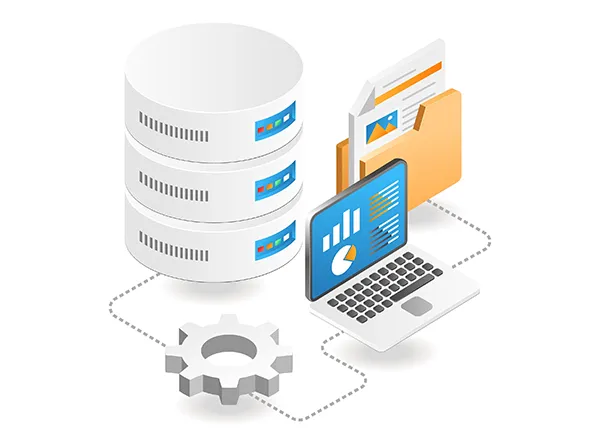Hello!
A Database Management System (DBMS) is a sophisticated framework that allows users to create, manage, and administer databases while ensuring regulated access to the stored information.
 Essentially, a DBMS is a collection of software programs that enables users to insert, modify, and delete data as needed. Positioned as a bridge between the applications that interact with data and the data itself, the DBMS facilitates access where user programs request information, and the DBMS responds by retrieving or updating data accordingly.
Essentially, a DBMS is a collection of software programs that enables users to insert, modify, and delete data as needed. Positioned as a bridge between the applications that interact with data and the data itself, the DBMS facilitates access where user programs request information, and the DBMS responds by retrieving or updating data accordingly.
DBMSs come in various forms, ranging from small-scale systems designed for personal computers to large, enterprise-level systems that operate on mainframe computers.
They are widely utilized in numerous applications, such as automated library systems, flight booking platforms, automated teller machines (ATMs), and comprehensive inventory tracking systems for various industries.
At its core, a DBMS serves as essential software that provides the necessary tools for acquiring and managing a database while preserving important aspects of data integrity and usability.
Educating oneself through database-related projects or courses is an excellent way to gain practical knowledge about the functionality of DBMS, spanning from introductory concepts to more complex operations.
What is Database Management?
 A database management system consists of a structured collection of data records. These systems are specifically designed to organize, store, and manage data efficiently. Acting as system software, a DBMS enables users to retrieve, modify, maintain, and extract data from databases at will.
A database management system consists of a structured collection of data records. These systems are specifically designed to organize, store, and manage data efficiently. Acting as system software, a DBMS enables users to retrieve, modify, maintain, and extract data from databases at will.
DBMS tools typically oversee critical elements related to data management, including data formatting, record organization, field identification, and file architecture. These systems also enforce rules that validate and ensure the accuracy of the data.
Applications of DBMS are widespread, impacting various sectors such as banking, education, airlines, human resources, manufacturing, and sales, among others.
Databases can be categorized as non-relational, which tends to present data in a simple list format, or relational, which organizes data into structured tables. To interact with relational databases effectively, skills such as those provided by Ruby on Rails developers may be useful for tasks like data updates and executing complex queries.
Advantages and Disadvantages of Database Management Systems
Advantages of DBMS:
 - Enhanced Data Sharing: A DBMS fosters an environment where organized and well-managed data is more accessible to end users, enabling them to respond quickly to shifts in their business environment.
- Enhanced Data Sharing: A DBMS fosters an environment where organized and well-managed data is more accessible to end users, enabling them to respond quickly to shifts in their business environment.
- Improved Data Security: As the volume of data access increases, so does the risk of data breaches. A DBMS offers a robust framework for implementing effective security protocols and data privacy measures, reducing the potential for unauthorized access.
- Better Data Integration: Having widespread access to quality-managed data facilitates a comprehensive understanding of an organization’s operations. It becomes clearer to see how different departments or functions interconnect and affect one another.
- Streamlined Data Access: A DBMS allows for rapid responses to ad hoc queries—unanticipated requests for data manipulation or understanding. The DBMS efficiently processes these requests, sending back results in the form of a query result set, which users can utilize effectively.
- Informed Decision-Making: Access to well-organized data and improved retrieval mechanisms leads to the generation of higher-quality insights, which serves as the foundation for informed decision-making. Although a DBMS does not inherently ensure data consistency, it provides tools to enhance the accuracy and reliability of the information derived from it.
Disadvantages of DBMS:
 - Rising Costs: Implementing a DBMS can be costly due to the need for advanced software, robust hardware, and skilled personnel.
- Rising Costs: Implementing a DBMS can be costly due to the need for advanced software, robust hardware, and skilled personnel.
The ongoing costs associated with maintaining these systems—including upkeep of software and hardware, hiring qualified staff, and meeting regulatory compliance—can quickly add up. Often, expenses related to training and administration are underestimated during the implementation phase.
- Complexity of Management: The intricate nature of a DBMS necessitates highly trained personnel to manage the software and data effectively. This complexity can make it challenging to maintain optimal performance and security, particularly as data volume and user activity grow.
- Risk of Data Loss: While DBMSs are designed to be robust, they are not infallible. Neglecting proper backup and disaster recovery strategies can lead to significant data loss, which could cause substantial disruptions to operations.
- Potential Performance Issues: As databases grow and more users access them, performance limitations may arise. Without regular optimization, the efficiency of a DBMS might decline, impacting user experience and satisfaction.
 - Vendor Lock-in: Many organizations may find themselves dependent on a specific DBMS vendor, which can limit options for switching systems or adopting new technologies as business needs evolve. This dependence can hinder flexibility in a rapidly changing technological landscape.
- Vendor Lock-in: Many organizations may find themselves dependent on a specific DBMS vendor, which can limit options for switching systems or adopting new technologies as business needs evolve. This dependence can hinder flexibility in a rapidly changing technological landscape.
In conclusion, while Database Management Systems offer numerous advantages in the management and security of data, organizations must weigh these benefits against the potential drawbacks, such as costs, complexity, risk, and vendor dependencies.
A thoughtful approach to selecting and implementing a DBMS is crucial for maximizing its benefits while mitigating associated challenges.
Also read:
- Using Google Display Ads to Improve SaaS Marketing: A Guide to Best Practices
- Mastering SEO for Moving Companies
- 5 Tips For A Successful Mail Campaign
Thank you!
Join us on social media!
See you!






